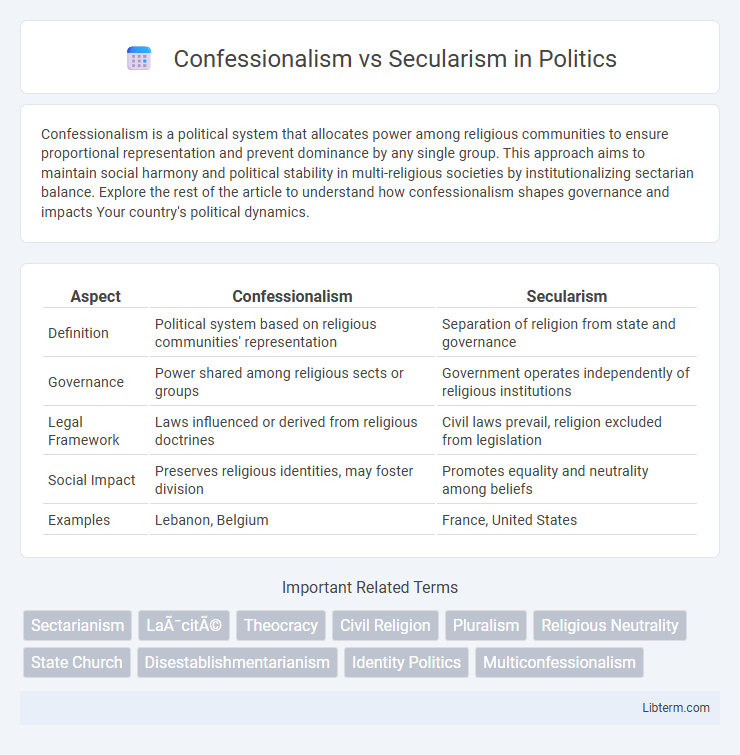Confessionalism is a political system that allocates power among religious communities to ensure proportional representation and prevent dominance by any single group. This approach aims to maintain social harmony and political stability in multi-religious societies by institutionalizing sectarian balance. Explore the rest of the article to understand how confessionalism shapes governance and impacts Your country's political dynamics.
Table of Comparison
| Aspect | Confessionalism | Secularism |
|---|---|---|
| Definition | Political system based on religious communities' representation | Separation of religion from state and governance |
| Governance | Power shared among religious sects or groups | Government operates independently of religious institutions |
| Legal Framework | Laws influenced or derived from religious doctrines | Civil laws prevail, religion excluded from legislation |
| Social Impact | Preserves religious identities, may foster division | Promotes equality and neutrality among beliefs |
| Examples | Lebanon, Belgium | France, United States |
Understanding Confessionalism: Definition and Origins
Confessionalism is a political system that allocates power among religious communities based on their demographic weight, primarily originating in multi-religious societies like Lebanon and Belgium to manage sectarian diversity. This system institutionalizes religious identities within governance structures to promote coexistence and prevent dominance by any single group. Understanding confessionalism requires analyzing its historical roots in balancing sectarian interests and its impact on political stability and representation.
The Principles of Secularism Explained
Secularism promotes the separation of religion from government institutions, ensuring that public policies and laws are free from religious influence, thereby maintaining state neutrality in matters of faith. It advocates for equal treatment of all citizens regardless of their religious beliefs, protecting individual freedoms and promoting social cohesion. Key principles include freedom of religion, non-establishment of religion by the state, and equal rights for all individuals irrespective of their religious affiliations.
Key Differences Between Confessionalism and Secularism
Confessionalism prioritizes the recognition and integration of specific religious identities within political and social systems, often granting official status to particular faiths and influencing governance through religious principles. Secularism advocates for the separation of religion from state affairs, ensuring that religious beliefs do not dictate laws or public policies, promoting equal treatment of all religious and non-religious groups. The key difference lies in confessionalism's emphasis on religious affiliation shaping political structures, whereas secularism maintains neutrality, preventing religious dominance in public institutions.
Historical Development of Confessional and Secular States
Confessionalism emerged historically as a political system where state power is distributed according to religious affiliations, notably seen in Lebanon's National Pact of 1943 that institutionalized sectarian representation to maintain communal balance. Secularism, gaining prominence during the Enlightenment and solidified by the French Revolution, advocates for the separation of religion and state, promoting governance based on rational-legal principles rather than religious doctrines. The contrast between confessionalism and secularism reflects divergent responses to managing religious diversity within states, influencing constitutional frameworks and social cohesion across different historical contexts.
Confessionalism in Modern Governance: Case Studies
Confessionalism in modern governance embodies power-sharing arrangements based on religious or sectarian identities, aiming to maintain political stability in diverse societies. Lebanon's National Pact and Iraq's post-2003 political system exemplify confessionalism by allocating government positions according to religious sects to ensure representation and prevent dominance. Despite challenges like sectarian tension and political gridlock, confessionalism remains a critical framework in managing pluralism within deeply divided nations.
Secularism’s Impact on Society and Politics
Secularism promotes the separation of religion from government and public institutions, fostering inclusive policies that accommodate diverse beliefs and reduce religious conflicts. It encourages rational decision-making and equal rights by preventing religious doctrines from influencing laws and political agendas. This shift enhances social cohesion and political stability by prioritizing universal human rights and democratic principles over sectarian interests.
Advantages of Confessional Political Systems
Confessional political systems promote power-sharing among religious groups, fostering political stability in deeply divided societies by ensuring representation for diverse faith communities. These systems can enhance social cohesion by recognizing and institutionalizing religious identities, reducing the likelihood of sectarian conflict. Moreover, confessionalism often encourages consensus-building and cooperation among political actors, which can lead to more inclusive governance and mutual respect among different religious factions.
Challenges and Criticisms of Secularism
Secularism faces challenges related to perceived marginalization of religious communities and conflicts over public expressions of faith, often leading to debates about freedom of religion versus state neutrality. Critics argue secularism can inadvertently suppress religious identity, fostering social fragmentation and resentment among faith-based groups. These tensions complicate efforts to maintain a neutral public sphere while respecting diverse cultural and religious traditions.
Societal Implications: Religious Freedom vs. State Neutrality
Confessionalism, which integrates religious principles into governance, often limits religious freedom by privileging certain faiths, impacting minority groups' rights and societal cohesion. Secularism, emphasizing state neutrality in religious matters, protects diverse religious expressions by preventing governmental endorsement or discrimination based on faith. The societal implications revolve around balancing individual freedom of religion with maintaining an impartial state framework that fosters pluralism and social harmony.
The Future of Confessionalism and Secularism in a Globalized World
Confessionalism, rooted in religious power-sharing, faces challenges in a globalized world where secularism promotes state neutrality and individual freedoms. The future of confessionalism depends on its ability to adapt to increasing multiculturalism and transnational influences while balancing communal identities with universal democratic principles. Secularism's emphasis on separation of religion and state may grow stronger, yet hybrid models blending both systems are emerging in diverse societies to maintain social cohesion amidst globalization.
Confessionalism Infographic

 libterm.com
libterm.com